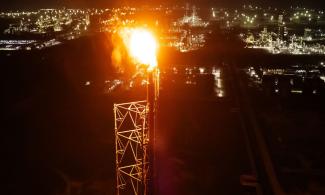
A critical facet of the air quality conundrum in Lagos lies in the actions of private companies. The majority of these entities, whether knowingly or unknowingly, contribute to the violation of air quality protection regulations. The cumulative impact of their actions casts a shadow over the health and well-being of the populace and underscores the need for stringent regulatory enforcement.
As the Dangote Refinery in Lagos gears up for the production of refined products, a cloud of concern hovers over the city regarding the Air Quality Index (AQI). Recent data underscores the pressing need for proactive measures to safeguard the environment, the health of Lagosians, and the delicate marine ecosystem.
The quality of air in cities is a silent guardian of our well-being. However, recent findings paint a disconcerting picture of air quality in Lagos. Akoka, a university cum community on the distant brink of the impending refinery operations, registers a staggering 124.1 daily micrograms per cubic meter, indicative of unhealthy air quality.
In contrast, Lagos Port in Apapa exhibits a moderate air quality index of 25.0 daily micrograms per cubic meter.
This discrepancy, while alarming, merely scratches the surface of a larger issue. None of the committees or local government areas in Lagos can boast of good air quality, as per recent statistics from the Lagos State Environment Protection Agency (LASEPA). The majority of private companies including hotels in Lagos State stand culpable for violating air quality protection regulations, contributing significantly to the deteriorating air conditions across the state.
As Dangote Refinery positions itself as a leading producer of refined products, it unavoidably becomes a titan in the realm of air pollution. The very nature of refinery operations involves processes that release pollutants into the air, setting the stage for potential environmental challenges. The impending gas flaring from the refinery adds a layer of complexity, with the potential to exacerbate the already compromised air quality in Lagos.
A critical facet of the air quality conundrum in Lagos lies in the actions of private companies. The majority of these entities, whether knowingly or unknowingly, contribute to the violation of air quality protection regulations. The cumulative impact of their actions casts a shadow over the health and well-being of the populace and underscores the need for stringent regulatory enforcement.
The statistics don't lie; the air quality in Lagos is at a critical juncture. The imminent danger lies in the potential exacerbation of these conditions when Dangote Refinery begins its production operations. Gas flaring, a common practice in refinery activities, poses a substantial threat if not meticulously managed. As the refinery stands in the heart of a megacity, the stakes are higher, and the potential consequences far-reaching.
Beyond the concerns of gas flaring, the specter of oil spoilage looms large. Dangote Refinery's location in a megacity necessitates a comprehensive plan to anticipate, manage, and mitigate potential oil-related incidents. The consequences of oil spoilage on aquatic marine life and the broader ecosystem demand immediate attention and strategic planning.
In light of these challenges, the onus falls on the Commissioner for Environment and Water Resources, Tokunbo Wahaab, to lead the charge in safeguarding Lagos. Strengthen the enforcement of air quality protection regulations, ensuring that private companies adhere to prescribed standards.
Implement robust penalties for non-compliance to serve as a deterrent. Engage in proactive collaboration with Dangote Refinery to implement advanced technologies and stringent measures that minimize gas flaring and emissions. Develop a transparent framework for ongoing monitoring and compliance and to mention but a few.
As Lagos stands at the precipice of increased industrial activity, the imperative to balance progress with environmental responsibility has never been more crucial. Dangote Refinery's impending operations demand a coordinated, strategic approach to protect the environment, the health of Lagosians, and the fragile marine ecosystem.
Commissioner Tokunbo Wahaab holds a key role in steering the city toward a sustainable future. The consequences of inaction could reverberate for generations to come, and the time to act is now. Lagosians deserve a future where clean air is a fundamental right, and the city's ecological balance is preserved for the well-being of all.
Oshunfurewa is a social activist from Lagos State.
08035936663